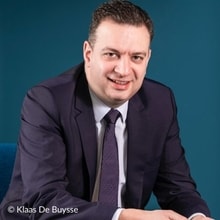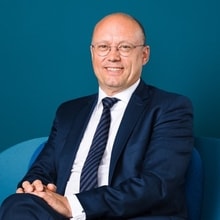Digital notary uses super-secure private network
Published on 17/07/2020 in Customer Stories
The digitization that the Royal Federation of Belgian Notaries (Fednot) has been pushing through in recent years has been worth its weight in gold during the corona crisis. Fednot came up with a solution in record time for the fully digital execution of deeds by notaries. The Secure Notarial Network (Beveiligd Notarieel Netwerk) is one of the pillars for the further development of Fednot services.

The corona crisis forced notaries to work from home, too. During the first weeks of ‘lockdown light’, the notary was in theory only available for executing urgent deeds. After those first weeks, the situation showed a little more flexibility, allowing notaries to work full-time again – albeit remotely where possible. It was at this point that the corona crisis provoked a digital acceleration in the notary sector.
“Digitization was of course already well underway”, says Jan Sap, CEO at Fednot, “with tools aimed at greater efficiency and time-saving, both for the notary and the client. That enabled us to quickly implement extra steps during the crisis.”
In practice, a legal framework was required as a basis for the fully digital execution of a notarial deed. “It’s not enough to have a video link,” says Gerdy De Clercq, CIO at Fednot. “There was a legal problem. The execution of a deed requires a physical interaction between notary and client.”
A rapid change in the law thus created the digital power of attorney. Behind the scenes, the Fednot IT team got to work on the technical implementation of the digital power of attorney. A handbook was also developed and in no time training sessions were organized for the notaries. “A process that would have normally taken more than a year, was now completed in a month,” says Jan.
Our digital transformation was already well underway. It enabled us to make a rapid switch during the corona crisis.
Jan Sap
Authenticity from a distance
The principle of the digital power of attorney is as simple as it is efficient. Using a digital signature, the client gives the power of attorney to a person who is physically present in the notary’s office. In practice, this is often an assistant working for the notary. This allows deeds to be executed remotely without compromising physical interaction.
Jan: “In the case of a house sale, for example, the buyer and seller both give power of attorney to a member of staff working for their notary. These members of staff constitute the physical interaction in situ, after which the notaries execute the notarial deed via video, a process that can be observed remotely by the buyer and seller.
“The whole exercise is about authenticity,” says Gerdy. “This is not just any signature. It is a qualified digital signature based on an electronic identity card. That digital signature together with the deed forms an inseparable whole.” For Fednot this was the logical next step for a solution that already existed and that enabled two notary firms to execute a deed remotely via the Secure Notarial Network (BNN). Previously, the clients in question still had to go in person to their own notary for this purpose. That is no longer the case.
The corona crisis gave this way of working a real boost. Since then, more than 10,000 short video conferences (15 to 30 minutes) and around 7,000 long conferences (longer than 30 minutes) have taken place. Today, the numbers are still rising.
In September 2020, these video conferences resulted in 7,986 notarial deeds executed remotely between two notary firms. That is no less than 363 deeds per working day. A record since the effective rollout in September 2019.
A total of 38,161 notarial deeds have already been executed remotely. This means that more than 5 million kilometers have been saved and with that CO2 emissions were reduced by 920 tons.
Source : FedNot - September 2020
In tune with the times
The option to execute deeds from two separate places provides the notary with an important working tool. “The number of deeds going between firms via the BNN is doubling every month,” says Gerdy. “It makes the firms more productive and efficient.” Since the corona crisis the general public has also become more confident using video.
“That said, we’re not expecting all deeds to be notarized through video in the near future,” says Jan. “The corona crisis has also shown that there are limits. You can’t digitize everything. The notary is present at many key moments in a person’s life: a marriage, a house purchase, an inheritance. That personal contact is still important.”
At the same time, the notary wants to stay in tune with the times. “We assume that clients prefer to come to the notary’s office for confidential or delicate matters,” says Jan. “but as a federation we want to offer notaries the opportunity to give their clients a choice.” So, there will be an online calendar, where clients can schedule a meeting with their notary. “That may not seem very revolutionary,” says Gerdy, “but that’s only just become available. The online calendars also reflect the role of the notary: to offer the best possible service to the client.”
The Secure Notarial Network (BNN) provides the Federation for Notaries, Fednot, with a solid basis for the further digitization of its members. ECOMPASS Group has rolled out the secure network for more than a thousand notaries.
BNN for 1,000 notariesThe BNN is a network that is screened off from the public internet but still always accessible. Discover the power and possibilities.
What is the BNN?The Secure Notarial Network is an important pillar for developing new digital services.
Gerdy De Clercq
Super-secure network
Applications like Biddit and eStox also fit into that context. Biddit is the digital equivalent of the traditional public auction. It allows citizens to buy property online under the supervision of a notary without having to go in person to a public session. The electronic share register eStox is an initiative of Fednot and the Institute for Tax Advisors and Accountants (ITTA, the former Institute of Accountants and Tax Consultants (IAB).
It replaces the traditional, manual registration of shares on paper. In other words, the paper share register that is often out of date or, worse still, gets lost. The afore-mentioned BNN will play a key role in all these new digital applications. BNN is a very secure, instantly available network that remains totally separate from the public internet.
Via BNN, notary firms can securely contact each other and Fednot, and procure secure access to the internet. More than a thousand notaries – more than ninety percent of all Belgian firms – have already joined the network. “The BNN is one of the pillars on which we are rolling out other services,” says Jan.
“The use of video-conferencing is just one example.” Fednot prefers a private network because of the high degree of security. “The notary represents quality, privacy and authenticity,” says Jan. “For this reason alone, a private network – with above-average security – was the best choice.”
Bridging communities
Fednot would like to extend its digital services. “We are aiming for more transparency,” says Gerdy. “Clients can already consult with their notary via Webex. In time we will be adding other solutions, like Teams.” Fednot also wants to build bridges with other ‘closed’ communities, such as government service networks. “But for all these exercises, security is our number one priority,” says Gerdy. “We will be focusing even more on this area in the future.”
Jan Sap studied law in Leuven and Louvain-la-Neuve. He worked for Unizo for more than twenty years, ten of which as secretary-general of the Flemish Federation of Liberal Professions. He has been the new CEO at Fednot since the end of 2018.
Gerdy De Clercq studied at the Royal Military Academy of Belgium and started his career as an IT manager working for the Ministry of Defense. For eighteen years he filled various positions within Proximus, and he was CIO and Managing Director at Baloise Insurance. Since 2018, he is CIO of Fednot.
Fednot provides support for notary firms in the form of legal advice, IT solutions, office management, training, and information for the general public.
One
One magazine is the Proximus B2B magazine for CIOs and IT professionals in large and medium-sized organisations.

